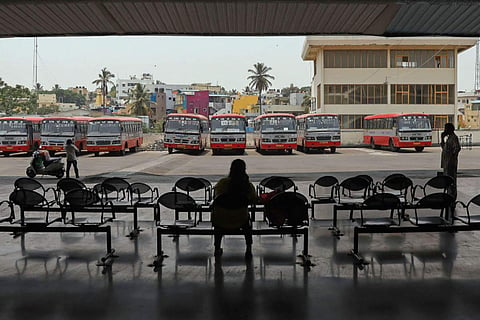

“We are the most overworked, yet we were not given salaries on time. Not even during Diwali. If the employees of the Electric Supply Companies get salary on time, then why can’t we?” asks Harish, a Karnataka State Road Transport Corporation (KSRTC) employee based in Bengaluru. Harish, along with nearly a lakh of his colleagues from the KSRTC, Bangalore Metropolitan Transport Corporation (BMTC), North-West Karnataka Road Transport Corporation (NWKRTC) and North-East Karnataka Transport Corporations (NEKRTC) are on strike for the fifth straight day as of Sunday.
“We want them to pay us nothing more or less than what we deserve. We also have families to take care of. And the onus to give resolution to this problem (of the strike) lies with the government,” adds Harish.
The present strike, which started on Wednesday is a culmination of events starting from December, 2020 even though the roots of the problem have historical foundations.
Although employees of government-owned companies, these workers don’t enjoy the perks of regular government employees and their salaries are primarily dependent on the revenues of the respective corporations.
So, with these companies suffering losses due to the COVID-19 pandemic-induced slowdown, the salaries of 1.25 lakh workers were stuck more than once since May, 2020. And the workers only received their October salaries in late November, way past Diwali, after the intervention of the Karnataka Chief Minister BS Yediyurappa.
Unlike the transport workers, as Harish pointed out, employees of the power distribution companies like the Bangalore Electricity Supply Company (Bescom), also owned by the state government are not dependent on the profit or loss of the companies.
Frustrated with the uncertainty of their income, in December some RTC workers had rallied under farmer leader Kodihalli Chandrashekhar and demanded pay parity with state government employees. And soon other transport workers, irrespective of their affiliations with various recognised labour unions, joined their fold.
The workers at that time had gone on a flash protest and the strike continued for three days after which the protesting employees and the government came to an agreement. And one of the points agreed was that the state government will proactively look at implementing the Sixth Pay Commission for all these RTCs. And this current strike is in protest of the state government allegedly going back on its promise.
Needless to say, like in December, this ongoing strike has left the public transport system paralysed even though the state government has attempted stopgap measures. Exams by various universities have also been postponed on account of this strike.
By the fourth day, only 2413 out of the 24,000 buses hit the roads even though the RTC management were cracking down on employees using various tactics.
Jagee Gowda, RTC Employees Union President, said, "The strike is for the sake of employees. We had given the government time of over 100 days (since December) to fulfill our demands. We are ready to go back to work within an hour, just let the government promise that we will be paid according to the Sixth Pay Commission from whichever date.”
Anand, President of the BMTC Employees Union, said, “We don't know when this will be resolved. The government is forcing the families of employees to vacate their quarters to stop us from continuing this strike."
The RTCs are also terminating the employment of those probationary employees who are supporting the strike and transferring “troublemaker” employees unilaterally.
According to the government, implementing the Sixth Pay Commission would mean that the government has to pay 30% more of their existing expenditure and the same is not feasible especially given the slump in revenues.
The Chief Secretary of Karnataka P Ravi Kumar, since the eve of the strike has ruled out a discussion stating that the government can only consider an 8% raise in salaries. Unhappy with the unilateral stance, the majority of the workers are determined to go on strike even as they lose out on their daily salaries and even risk losing their employment altogether.
Speaking with TNM, some labour rights activists said that the demand for a Sixth Pay Commission comes as over the years the workers' pay has been getting revised unilaterally every 4-5 years as decided by the RTCs and the governments.
One activist, on condition of anonymity, said, “The demand for the Sixth Pay Commission stems from the fact that these workers were not taken into confidence during the salary revision process. And the recent delay in salaries have made the workers stick to this demand on an emotional basis. But the fact of the matter is, there is no clarity under which category these workers fall under the Sixth Pay Commission and what are the minimum academic qualifications for them correspondingly.”
She suggested that while an 8% hike in salaries may not be enough, the government should propose a reasonable 15% hike and start dialogue with the workers to come to an amicable solution.